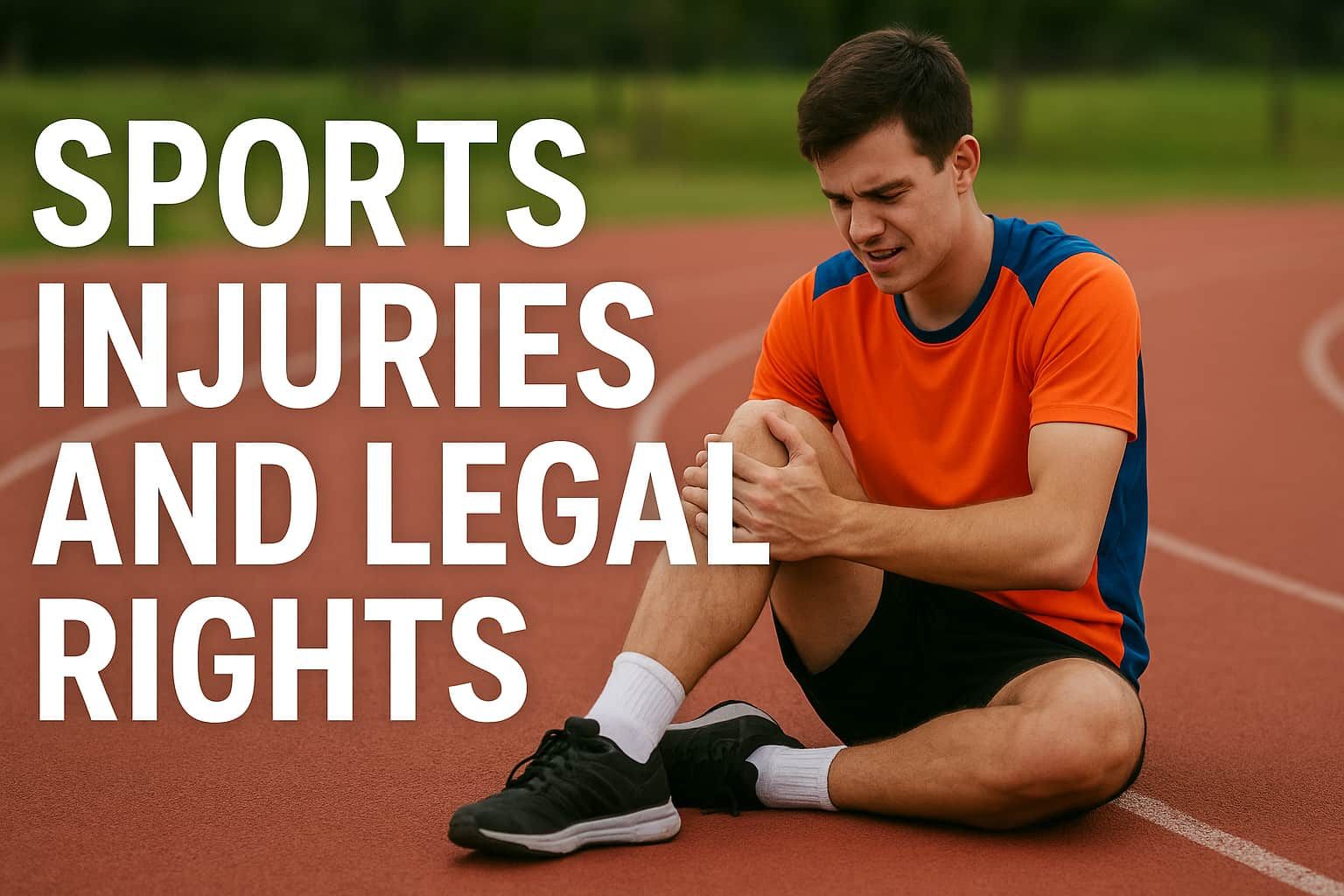Sports injuries affect millions of athletes every year, from weekend joggers to Olympic champions.
While some injuries are unavoidable, many happen due to negligence, faulty equipment, or unsafe conditions.
When accidents occur, medical bills can reach thousands of dollars. Athletes often miss work, school, or important competitions.
For help with recovery and quick training plans, visit Sports Injuries. Understanding your legal rights helps protect your finances and future.
Most athletes are unsure of the steps to take after an injury. This guide explains sports injury law in simple terms, helping you make smart decisions.
Sports Injuries and Legal Rights

This guide explains sports injury law in simple terms, helping you make smart decisions during stressful times.
Why Athletes Should Know Legal Basics?
Here’s why understanding your rights matters:
- Protect yourself – Know what help you can get when things go wrong
- Get fair compensation – Don’t miss out on money you deserve for medical bills
- Use insurance properly – Understand what your policies cover before you need them
- Avoid bad choices – Make smart decisions when you’re hurt and stressed
Common Types of Sports Injuries
These are the most frequent injuries that cause legal issues:
- Sprains and strains – Twisted ankles, pulled muscles, torn ligaments
- Fractures – Broken bones from falls, collisions, or impacts
- Concussion – Head injuries from contact sports or accidents
- Overuse injuries – Problems from too much training without proper rest
- Equipment-related injuries – Hurt by faulty gear, broken facilities, or poor maintenance
Who Can Be Legally Responsible?
Several people or groups might be liable for your sports injury:
- Venue or stadium staff – If playing surfaces are unsafe or facilities are poorly maintained
- Coaches or trainers – If they provide poor supervision, bad advice, or unsafe training methods
- Equipment makers – If sports gear is faulty, defective, or dangerous when used properly
- Other players – Rarely, but possible if their actions were reckless or intentionally harmful
- Employers or clubs – For paid athletes, workers’ compensation may apply in some countries
Step-by-Step: What to Do After a Sports Injury
Follow these important steps to protect your health and legal rights:
- Get medical care first – Your health is always the top priority, even before legal concerns
- Ask for written medical notes – Keep all records, test results, and doctor reports safe
- Take photos of the scene and injury – Document hazards, bad equipment, or unsafe conditions
- Notify the coach, club, or venue in writing – Send official notice and keep a copy for yourself
- Keep all receipts – Save bills for treatment, travel costs, and missed work income
- Check insurance rules – Review club insurance, personal coverage, travel policies, and event protection
- Talk to a lawyer if needed – Find someone who knows sports law or personal injury cases
Simple Table — Types of Legal Claims
| Claim Type | Who May Be Liable | When It Applies |
|---|---|---|
| Negligence | Venue, staff, coach | Poor care or unsafe place |
| Product liability | Equipment maker | Faulty or dangerous gear |
| Workers’ comp | Employer or club | Paid athletes, on-duty injuries |
| Insurance claim | Athlete’s insurer/event insurer | Medical costs, lost wages |
How Insurance Works?
Understanding insurance can save you money and stress:
- Check event insurance and travel insurance before you participate in any sports activity
- Different policies cover different things – some pay medical bills, some cover canceled trips, some pay nothing
- Workers’ compensation rules vary by country and region, so check your local laws
- Read the fine print – know what activities and injuries your policy covers or excludes
When to Get Legal Help?
Consider talking to a lawyer in these situations:
- High medical bills, and your insurance company denies your claim or pays too little
- Venue or organization refuses responsibility for an injury that seems to be their fault
- Long-term disability or major loss of income from your sports injury
- Small disputes can sometimes be solved with a legal letter rather than a full lawsuit
Quick Tips to Avoid Injury-Related Legal Trouble
Protect yourself with these simple steps:
- Read event rules and posted signs carefully before you play or compete
- Wear correct safety gear and follow all instructions from coaches and officials
- Use licensed coaches and rent equipment from trusted, reputable companies
- Keep copies of everything – tickets, waivers, emails, and any signed documents
Short Checklist Before You Play or Travel
Do these things before any sports activity:
- Check your health insurance and buy travel insurance if you’re going to another country
- Ask event organizers about their safety measures, medical staff, and emergency procedures
- Pack a small first-aid kit and bring any personal medicines you might need
- Save emergency contacts and local hospital information in your phone
FAQs on Sports Injuries and Legal Rights:
- How long do I have to file a claim?
Laws differ by place and type of claim; check local rules quickly after your injury
- Does signing a waiver stop all claims?
Not always – waivers can limit liability, but may not protect against gross negligence or intentional harm
- Will my sports club pay my medical bills?
Sometimes, if they are at fault; check their insurance policies and your membership contract
- Can I sue another player who hurt me?
Usually, only if they acted with intent to harm or were extremely reckless beyond normal sports contact
- What if I get hurt in another country?
Check your travel insurance and that country’s laws; some places have different rules for tourists
Conclusion and Call to Action
Sports injuries are part of the game, but you don’t have to face the legal side alone. Know your rights, act quickly when injuries happen, and always put your health first. Keep good records and don’t be afraid to ask for help when you need it.
The most important thing to remember is that your health comes before any legal or financial concerns. Get proper medical care immediately after any injury. Everything else can wait until you’re stable and thinking clearly.
Prevention is always better than dealing with legal problems later. Check your insurance coverage before you play. Read the rules and safety guidelines. Use proper equipment and listen to qualified coaches.
If you do get injured, don’t panic. Follow the step-by-step guide in this article. Take photos, keep receipts, and document everything. Most injury cases are resolved through insurance claims, not lengthy court battles.
Understanding basic legal rights helps you focus on getting better instead of worrying about money and paperwork. You can make informed decisions about your care and recovery. Knowledge gives you confidence during a stressful time.
Remember that every situation is different. Laws vary by location and type of activity. When in doubt, ask questions. Talk to insurance companies, event organizers, or legal professionals who understand sports law.
Don’t let fear of legal issues stop you from playing sports you love. With proper preparation and knowledge, you can enjoy athletic activities while protecting yourself from unnecessary risks.
Visit Sports Training Guides
Authority Links:
- American College of Sports Medicine — https://www.acsm.org
- Centers for Disease Control & Prevention (Injury Prevention) — https://www.cdc.gov/injury
- National Athletic Trainers’ Association — https://www.nata.org
- National Collegiate Athletic Association (sports medicine & safety) — https://www.ncaa.org
- American Bar Association — https://www.americanbar.org
- FindLaw (personal injury & sports law resources) — https://www.findlaw.com
- World Health Organization — https://www.who.int



